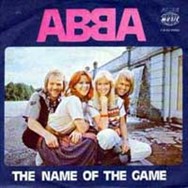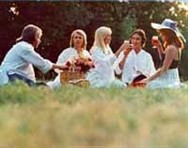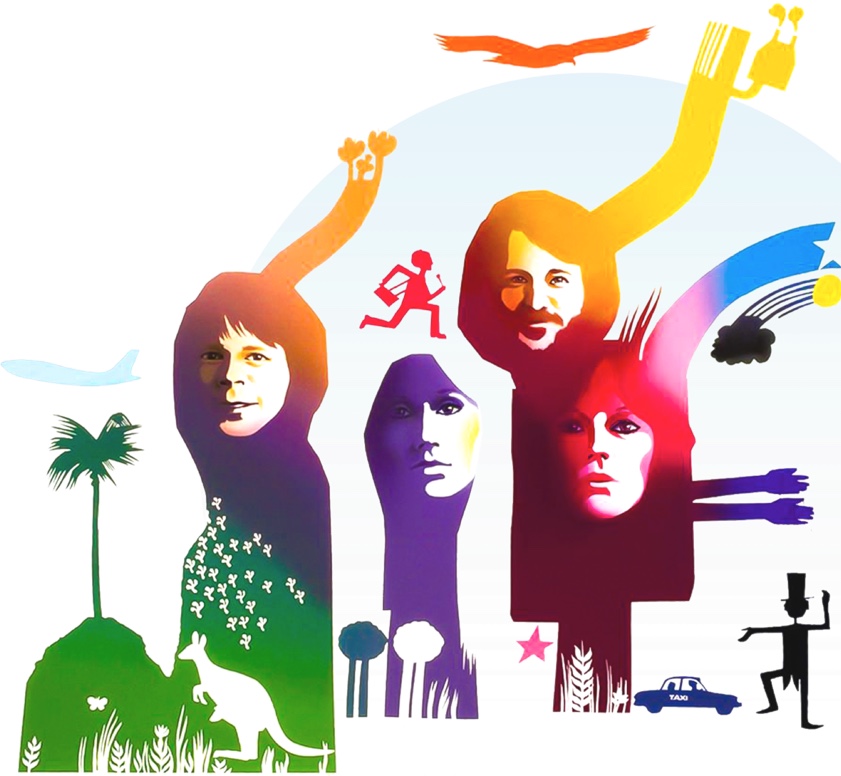In Focus: The Name Of The Game – Into A New World
‘The Name Of The Game’ was ABBA’s first brand new single of 1977, opening up a new chapter in their amazing story.
What Rufus said
 While it is well-known that journalists and critics have often had a difficult relationship to ABBA and their music, the group’s love affair with the general public has generally been more straightforward. The same goes for ABBA’s peers – other musicians: their competition back in the 1970s, such as the members of Led Zeppelin, as well as those who came later, with U2’s Bono as the most frequently held-up ABBA champion. And lest there be any doubt about the group’s relevance in the current musical landscape, they also have plenty of admirers among the new generation of musicians. Take, for instance, Rufus Wainwright, one of the most acclaimed new artists in recent years. In a magazine article, the singer was asked to name a “guilty pleasure”. “ABBA are a bit of a guilty pleasure, I guess,” Wainwright replied. “I sing ‘The Name Of The Game’ when I’m looking in the mirror every morning. What a great song!” Visitors to ABBA – The Official Site no doubt agree that ABBA are a pleasure, guilty or not, and some may even agree with Rufus Wainwright in singling out ‘The Name Of The Game’ as a highlight in the group’s work. So why not use his endorsement as an excuse take a closer look at this fascinating and intriguing recording.
While it is well-known that journalists and critics have often had a difficult relationship to ABBA and their music, the group’s love affair with the general public has generally been more straightforward. The same goes for ABBA’s peers – other musicians: their competition back in the 1970s, such as the members of Led Zeppelin, as well as those who came later, with U2’s Bono as the most frequently held-up ABBA champion. And lest there be any doubt about the group’s relevance in the current musical landscape, they also have plenty of admirers among the new generation of musicians. Take, for instance, Rufus Wainwright, one of the most acclaimed new artists in recent years. In a magazine article, the singer was asked to name a “guilty pleasure”. “ABBA are a bit of a guilty pleasure, I guess,” Wainwright replied. “I sing ‘The Name Of The Game’ when I’m looking in the mirror every morning. What a great song!” Visitors to ABBA – The Official Site no doubt agree that ABBA are a pleasure, guilty or not, and some may even agree with Rufus Wainwright in singling out ‘The Name Of The Game’ as a highlight in the group’s work. So why not use his endorsement as an excuse take a closer look at this fascinating and intriguing recording.

A bit of themselves

The writing process began with the bass and synthesizer riff that opens the song. The riff sounded like a distant cousin to a recent hit entitled ‘I Wish’, written and recorded by another Los Angeles-based artist and ABBA favourite to boot: Stevie Wonder. Once the backing track had been perfected, the final lyrics were written for the song. ABBA manager and sometimes lyricist Stig Anderson contributed a brand new title, and thus ‘A Bit Of Myself’ changed into ‘The Name Of The Game’.
It was imperative that ABBA got going with the recording sessions for the new album. In actual fact, the end of May was a little late to get started, since the plan was to have the album out at the same time as the brand new feature film, ABBA – The Movie, scheduled for a December release. The bulk of the film had been shot in Australia in March 1977, while the group was out on a concert tour. The concert scenes were the heart and soul of the picture, but director Lasse Hallström had also concocted a story about a radio DJ, desperately seeking an interview with the group.
Cinematic dreams



In September, ABBA – minus Agnetha, who was pregnant with her and Björn’s son, Christian – travelled to the town of Kungälv on the west coast of Sweden to work at another ultra-modern facility, Bohus Studio. The purpose of the trip was to polish the live concert recordings for the film soundtrack, but also to mix ‘The Name Of The Game’ in preparation for the single release. A month later, on October 17, ‘The Name Of The Game’ was finally released in Sweden, with a live version of ‘I Wonder (Departure)’ on the B-side. That song hailed from ABBA’s mini-musical, The Girl With The Golden Hair, as performed on the concert tour earlier in the year.
Two voices becoming three
Accompanied by a promo clip filmed at Björn and Agnetha’s home, featuring the group playing the Ludo-like board game Fia, ‘The Name Of The Game’ stormed up the charts all over the world. However, although the single reached the Top Five in plenty of countries it seems the only place where it reached number one on the chart was Great Britain, where it spent four weeks at the top. In Australia, where almost everything ABBA released reached number one, the single experienced a slow climb to number six – certainly not a failure, but not as good as would have been expected for a brand new song in a country perceived as ABBA-crazy. Perhaps the group’s new direction simply took some getting used to.
There can be little doubt, however, that ‘The Name Of The Game’ is one of ABBA’s most captivating recordings, and one of their most “ABBA-like”, for want of a better expression. The sense of joy at testing the boundaries for what could constitute a catchy hit single is felt in each and every beat of the song. And rather than inviting pointless discussions on which of ABBA’s female vocalists was the better, it showcases the strengths of both voices, with Agnetha’s plaintive tones colouring some parts, and Frida’s warm intensity putting its mark on others. Above all, throughout the song the two women frequently joins forces to deliver the unique multi-layered vocal sound that was theirs alone: the famed “third voice”.
‘The Name Of The Game’ opened up a new chapter in ABBA’s musical history. The days of ‘Waterloo’ and ‘Mamma Mia’, brilliantly catchy as they may have been, were over. Since their international breakthrough three years earlier, ABBA had become experts at achieving the very best results in their songwriting and studio work. Now, as their new single made clear, it was time to apply the lessons learned to more complex and often more introspective musical creations. That, essentially, was the name of their new game.
